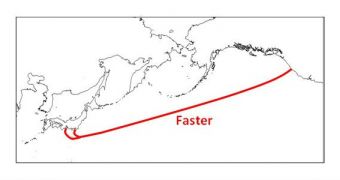Google has decided to get involved in a plan to build and operate a new high-speed Internet cable called “FASTER.”
The $300 million (€224.4 million) project will be managed not only by Google, but also by China Mobile International, China Telecom Global, Global Transit, SingTel and KKDDI, while NEC will be the system supplier.
The new cable will facilitate the intense traffic demands for broadband, mobile, applications, content and enterprise data exchange on the Trans-Pacific route. FASTER will feature the latest high-quality 6-fiber-pair cable and optical transmission technologies, with an initial design capacity of 60Tb/s (100Gb/s x 100 wavelengths x 6 fiber-pairs).
The system will be landed at Chikura and Shima in Japan and will feature seamless connectivity to many neighboring cable systems to extend the capacity beyond Japan to other Asian locations.
In the United States, the system will extend to several major hubs on the West Coast, including Los Angeles, San Francisco, Portland and Seattle.
“FASTER is one of a few hundred submarine telecommunications cables connecting various parts of the world. These cables collectively form an important infrastructure that helps run global Internet and communications. The consortium partners are glad to work together to add a new cable to our global infrastructure. The FASTER cable system has the largest design capacity ever built on the Trans-Pacific route, which is one of the longest routes in the world. The agreement announced today will benefit all users of the global Internet,” said Woohyong Choi, chairman of the FASTER executive committee.
Google’s senior VP of technical infrastructure Urs Hölzle addressed the company’s involvement in the project over his Google+ account. “At Google we want our products to be fast and reliable, and that requires a great network infrastructure, whether it's for the more than a billion Android users or developers building products on Google Cloud Platform,” he said.
Hölzle added that sometimes the fastest path requires going through the ocean, which is why Google decided to invest in FASTER. This one joins other projects Google is involved in for similar purposes, such as UNITY in 2008 and the South-East Asia Japan Cable in 2011.
Google has been known to be particularly fond of providing speedy Internet connections, just as it does with Google Fiber, but it wants everyone in the world to get to have such speeds and for its services to run smoothly everywhere in the world. More importantly, it’s obvious that Google has deep enough pockets to sustain this passion.

 14 DAY TRIAL //
14 DAY TRIAL //